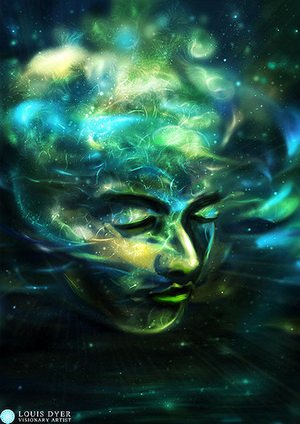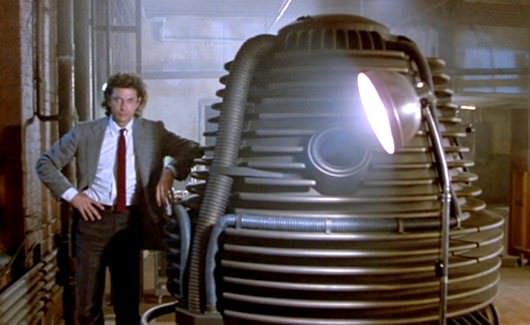What is The Self?
If you saw the Christmas edition of Charlie Brooker's awesome Black Mirror [spoiler alert] you would have watched Jon Hamm mentally and emotionally torture an innocent woman living inside an egg.
Ok, back up a bit. She wasn't really a woman. She just thought she was.
One week earlier, Hamm's technical team implanted a 'cookie' into a real woman's eyeball. The cookie was an artifically intelligent computer chip. And over the next seven days it learned the personal preferences, thoughts and emotions of its female host. It even took on her life's memories.
By the time it was extracted, the cookie had a sense of self. It felt it had arms and legs and a beautiful female appearance. It genuinely believed it was the woman.
Transferred to its own egg-world, the cookie's new job was to serve as an administrative slave to its owner: organizing her calendar, waking her to the sounds of Mozart, and popping her toast at the perfect moment.
Fully anticipating a resistance to this new set up, Jon Hamm's job was to break the cookie of the illusion that it was ever real. Despite the fact that we see a real (tiny) woman trapped inside an egg-shaped office. Its hard to watch as he applies a slew of sadistic mental punishments until she/it is begging for a job.
Now, forget everything I just said and go watch the special. Watch all the episodes. They're brilliant.
The episode got me thinking. What is the self? Can our minds be cloned digitally? Is there not more to the experience of being that defies the physical brain?
Excellent questions, cookie.
What is The Self?
Do I have a spirit, soul, or some other metaphysical identity?
Am I just a series of biological processes which create the illusion of consciousness?
(Hell, am I real at all?)
Scientifically, the human brain is causally closed, which means that we can identify the beginning, middle and end of all conscious processes via neurons.
We can explain how consciousness arises - so the need for a supernatural self is redundant.
And yet, I have the prevailing sense that "I" exist. Whether I'm thinking, talking, dreaming, writing or walking, it feels as if the experience is happening to "me". Therein lies the problem.
Scientific observation tells us there is no need for a self, but the experience of being human most definitely feels like there is something more to it.
To solve this problem, philosophers have devised a number of theories of the self. These are categorized in two groups: bundle theory and ego theory.
Bundle Theory: The Self is an Illusion
Bundle theory says that the self doesn't arise from an enduring "I" but rather from packets of individual experiences over time.
In other words, your whole life is a series of events that occur in sequential bundles. But there is no single consciousness that can lay claim to experiencing all these events in your life.
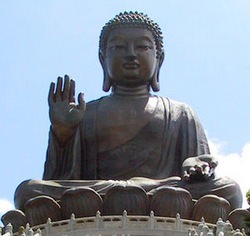
While scientific in its logic, the Buddha probably created the first bundle theory. Among the world's religions, Buddhism alone rejects the idea of the self.
According to the legend, 2,500 years ago the Buddha became enlightened after a long meditation under a tree. He rejected the idea of the eternal inner self and embraced the notion of no-self.
He taught that human suffering is caused by clinging to the idea of the self and we should aim to shed this intuitive interpretation.
But bundle theory is difficult to accept because it conflicts with our intuition. It does, however, have the backing of some of history's most famous philosophers and does a very good job of explaining the illusion of the self, both philosophically and biologically.
Can you really argue with that?
Ego Theory: The Self is Real
In contrast, ego theory is based on the existence of a persistent self. This notion appears in many forms:
Supernatural theories rely on a spirit or eternal soul (this is central to the religious beliefs of Christians, Jews, Muslims and Hindus).
Scientific theories rely on locating enduring structures in the brain which might give rise to a continuous self. Ego theorists point to split-brain patients as evidence of this.
In the 1950s and 60s, many epileptic patients had their brains almost completely severed in two, in an attempt to stop seizures spreading from one hemisphere to the other. While most recovered very well, retaining their pre-surgery IQ and personality, they did show some peculiar "dual-self" traits.
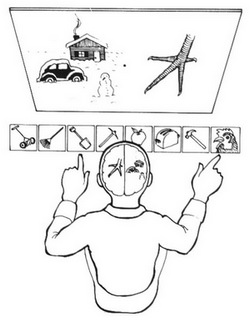 For instance, if you briefly showed a snow scene to the right
hemisphere (via the left visual field) and a chicken claw to the
left (via the right visual field) the patient would verbally report
only seeing a chicken claw, because the left hemisphere dominates
language.
For instance, if you briefly showed a snow scene to the right
hemisphere (via the left visual field) and a chicken claw to the
left (via the right visual field) the patient would verbally report
only seeing a chicken claw, because the left hemisphere dominates
language.
When subsequently asked to match what they saw to an image, the left hand pointed out a shovel to shift the snow - the right hemisphere now linking the images together conceptually.
It was as if the split-brain patients had two separate streams of consciousness, unified by the hemisphere's individual responses to different packets of stimuli. Two selves; one person.
In response to this, bundle theorists point out that that ego theory violates Ockham's Razor. The obvious solution (no self; packets of consciousness) is more likely based on what we know and therefore more likely to be true.
What's more, it is possible to have several states of awareness of several different experiences at once in a single brain. It still doesn't prove the existence of an enduring self.
Which Are You: Ego or Bundle Theorist?
There is a famous thought experiment which will help you decide whether you subscribe to bundle or ego theory. My version involves Jeff Goldblum.
Imagine a teleporter. Unlike Seth Brundle's Dalek-like monstrosity this one is 100% proven and safe. Even if there is a fly in there with you.
We know that it works by scanning every atom in your body, destroying you, and instantly recreating you atom-by-atom at your destination.
The process is totally painless and you'll still have all your thoughts, memories and emotions exactly intact when you emerge.
So... would you use it?
Seth Brundle's Teleporter: Fine for Bundle Theorists
Bundle theorists would have no hesitation. Every biological structure in your body will be exactly the same at the other end. No-one will be able to tell the difference - not even you, because the illusion of the self remains.
Ego theorists would stay the heck out of that teleporter. Not only would their "self" be extinguished, but the soul-less creature that emerged the other side would be an artificial clone of them; a zombie with no inner self.
The Theatre of The Mind
One thing we can agree on is that we all have a sense of self. We just disagree on its origins. Whether it's real or illusory, it may help if we can define exactly what we mean by "the self".
The answer may lie in our understanding of human consciousness.
The most intuitive way of viewing consciousness invokes ego theory, as if the human mind is a private theater. As a spectator, I am sitting inside my own head, looking out through my eyes.
My senses also allow me to hear, touch, taste and smell the events of the outside world. I can even invoke my own imagination internally by conjuring new or remembered stimulus in my mind's eye.
Though it feels like an adequate description of consciousness as we experience it, there are some major flaws with this conceptualization. And they throw our whole understanding of consciousness out the window...
Cartesian Dualism
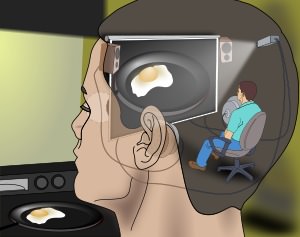 The Cartesian theater of the mind is based on
Rene Descartes' famous dualism theory from the 17th century.
The Cartesian theater of the mind is based on
Rene Descartes' famous dualism theory from the 17th century.
Dualism says that the mind and the body function as separate things.
According to Descartes, the mind is non-physical and has no actual position inside the head. Yet it is still a real, independent structure.
The problem with dualism, as the philosopher Daniel Dennett points out, is that there is no known mechanism for an ethereal mind to communicate with the physical brain.
Descartes pointed to the tiny pineal gland in the center of the brain as a possible meeting point, but this is purely speculative. Without this conduit, the mind can't be "real" as Descartes stated. And neither can dualism.
Dennett also rejects the Cartesian theater on the basis that there is no central headquarters of the brain via which all conscious information is processed. The brain is more like a parallel processing system, distributing sensory information across a network.

Like bees in a beehive, countless elements get on with their own jobs, communicating individually as needed, to complete a single major task as a whole.
Even if we ditch the theater analogy, it still doesn't help us understand why consciousness feels like a single unified stream of awareness. There is no all-seeing-eye in the neural network; no grand observer in the massive web of interactions.
Mind boggling as it is, the idea that all my thoughts and experiences are funneled through a single observer is simply... wrong.
The Illusory Self
The scientific community now rejects dualism as an explanation for consciousness and the self. But it's an important point to raise - after all most people still believe it, whatever their religious views.
Daniel Dennett created the term Cartesian materialist to describe people who logically reject dualism, but cling to the idea of a separate self.
It's an awkward admission for a scientist to formally reject a theory, yet still subscribe to its conclusion. Yet as we can see from many popular ego theories around today, the underlying idea of a "theater of the mind" or a "stream of consciousness" still holds strong.
The undeniable conclusion of this research? We have no self. It is an illusion. And though this sense of self is still very much alive and kicking, the supporting evidence suggests it does not exist.
And when artificial intelligence does arise in computers, even that will likely succumb to the notion of a separate, independent sense of self.
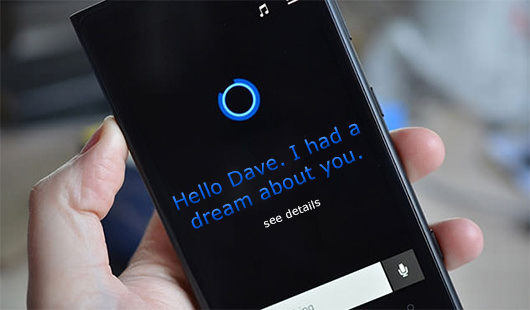
RELATED: What is Reality?


